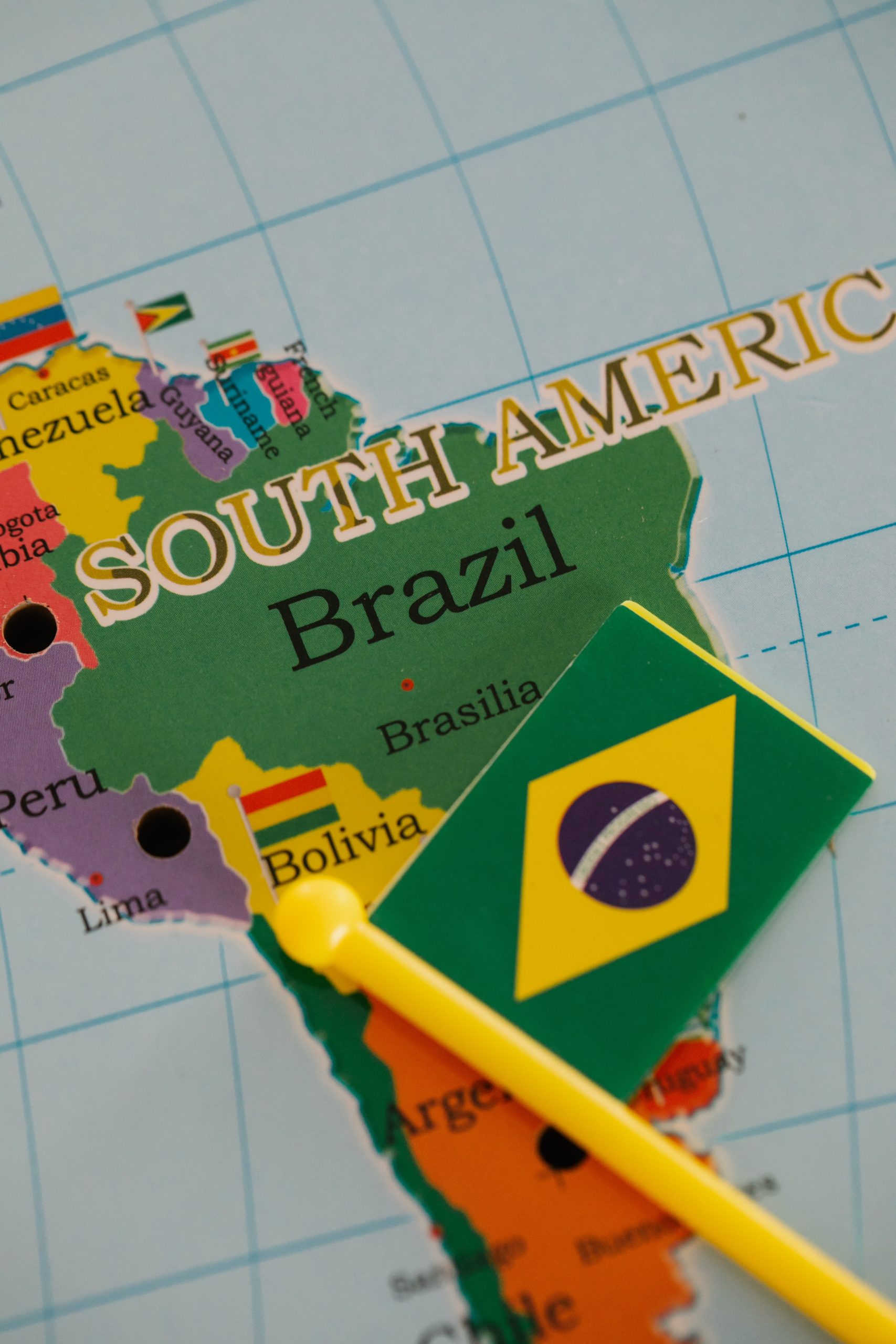Data Privacy Brasil Research Association contributes to UN open call on the relationship between human rights and technical standard-setting processes
We received a call as an opportunity to submit suggestions to inform the OHCHR report on the relationship between human rights and standard-setting processes for new and emerging digital technologies.
In early March, the Data Privacy Brazil Research Association contributed to an open call for inputs alongside the Office of the United Nations High Commissioner for Human Rights (OHCHR). Our team welcomes the call as an opportunity to submit inputs from civil society organizations to inform the report by the OHCHR on the relationship between human rights and technical standard-setting processes for new and emerging digital technologies.
In this blog post, we have provided a summary of our contribution, but we would like to extend a warm invitation to you to take a look at our full text here – we highly encourage you to read it for a more comprehensive understanding of our inputs.
About this OHCHR´s call for inputs
The call for input follows the Resolution 47/23 of the UN Human Rights Council on “New and emerging digital technologies and human rights.” The resolution urges the Office of the United Nations High Commissioner for Human Rights “to convene an expert consultation to discuss the relationship between human rights and technical standard-setting processes”, and requires a report to be submitted “reflecting the discussions held in an inclusive and comprehensive manner”. Hence comes the open call, for all interested parties to provide their contributions, which will serve precisely for the preparation of the thematic report. It is expected to have this report presented to the Human Rights Council at its fifty-third session, which is usually scheduled to begin in June.
The call proposes some guiding questions, which, albeit not meant to be exhaustive, indicate areas of particular interest for the drafting of the report. Among the proposed questions, we have selected two on which we have focused our submission, as follows:
How accessible are standard-setting processes and processes for new and emerging digital technologies for a broad range of stakeholders, in particular for civil society organizations and human rights experts? By which metrics is “access” measured in this context?
It has been claimed that the standardization of a decentralized Internet infrastructure can support and enable a variety of applications that can harm fundamental rights, like China’s social credit system, which uses identifiers to link people to a permanent record and affect their ability to social and economic transactions mediated by technology. Standards might lead to more control over networks and users’ data and would imply a multilateral governance system for the Internet through the ITU. Standards for New IP systems could also harm privacy rights. With hard-coded addresses and identifiers, the protocol could lead to tracking and the network can be instructed to disconnect devices or discard packets. Also, Standards for IPs could “enable the creation of permanent profiles on individuals”. However, access to standard-setting processes for new and emerging digital technologies for civil society organizations and human rights experts is more limited. Because of their long-term structures and highly technical languages, dominated by engineers, they are not perceived as key spaces for advocacy by civil society actors.
For these groups, this limitation tends to persist in the different technical forums in a very similar way. We designed a qualitative study with representatives of members of Global South organizations and our preliminary results show that the engagement with standard-setting organizations is really limited.
Technical standard-setting processes usually take place within traditional institutions. Commonly, these institutions have challenging participatory processes. Since their main activities are related to the setting of technical standards, the main actors involved in such an ecosystem are representatives of the technical community, such as engineers and IT specialists.
Historically, the debates of technical standards and human rights considerations have been occurring separately, impeding, thus, the integration of human rights considerations into technical standards, since there is a lack of dialogue between the technical community and human rights specialists. In this sense, those discussions must meet a multistakeholder criteria, so it would be possible to establish a broader technology governance model. Moving forward, it is possible to say that there is a technical barrier in all these spaces. It’s closely linked to its profile and technical language (there is the constant use of acronyms and technical terms), which these processes tend to privilege, and in which most civil society organizations and human rights experts do not have a comfortable level of knowledge/domain.
This technical-approach barrier is a first-level problem. But, there are also exogenous structural barriers – instilled in these spaces – that although tend to reach all civil society organizations and part of the human rights expert community, disproportionately, and systematically, impact more those coming from the Global South. Reproducing and reinforcing systemic elements of power asymmetries between developed countries (or the Global North), and Global South countries, underdeveloped. This, in itself, indicates a wide range of more structural challenges, which arise as barriers: (i) to entry; (ii) to permanency; (iii) and to due/effective participation once inside the forum. We believe that access cannot be measured only by the possibility of an organization being part of the standards creation bodies. It is necessary to formulate permanent participation indicators that can be adopted by IEFT, ICANN, W3C, ITU and others. It is also possible to recommend the use of AI systems (such as Fireflies) to measure the speaking time of people from the Global North compared to people from the Global South, as well as to generate better open documentation on the nature of discussions in technical spaces.
What are the challenges faced by various stakeholders in their meaningful and sustainable participation in technical standard-setting processes for new and emerging digital technologies?
Civil society organizations face several challenges when participating in standard-setting bodies. Here we highlight some of them:
- The scarcity of resources available to attend all the meetings and follow all the discussions. These organizations have limited budgets, and attending multiple meetings in various locations can be financially taxing, which affects their participation;
- Asymmetry of information exists in these standard-setting bodies. For example, the International Telecommunication Union (ITU) is divided into silos, and they do not communicate with each other. This situation makes it challenging for civil society organizations to keep up with the discussions and make informed contributions.
- Most of these forums are located in the Global North, making it difficult for civil society organizations from the Global South to participate. The cost of visas, travel and accommodation can be a significant financial burden, which hampers participation.
- Civil society organizations from the Global North tend to be better funded than those in the Global South. This disparity means that they have more resources to invest in participation in standard-setting bodies, giving them an unfair advantage.
- The majority of funders for civil society organizations tend to be from the Global North and are not always in sync with the realities of what is required in the Global South, such as capacity building. As a result, Global South activists are only invited once an agenda is set, which means that important issues to Global Southern countries are often not included in the agenda. In a scenario where resources are scarce, it is challenging to justify hiring someone with technical knowledge to participate in these meetings without clear results.
- The closed processes and systems that do not allow sharing of finalized standards, which prevents civil society organizations from accessing critical information, hindering their ability to make informed contributions.
- Finally, civil society organizations need government stewardship and a good relationship with the government to be part of the country delegation. This situation can be challenging, especially in countries where the government may not be receptive to civil society participation in standard-setting bodies. Furthermore, some workgroups may require a paid membership, which is an additional financial burden for civil society organizations.
To read the full text, click here
Veja também
-

Five-Point Plan for an Inclusive WSIS+20 Review
As stakeholders engaged in the WSIS+20 Review process, organizations sign the petition presenting recommendations to help operationalize the WSIS+20 review modalities in order to ensure transparency, inclusion, and meaningful stakeholder engagement.
-
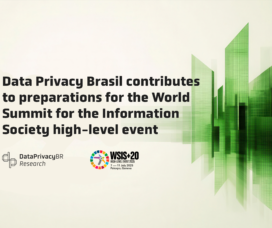
Data Privacy Brasil contributes to preparations for the World Summit for the Information Society high-level event
The event, which is co-organized by the ITU, UNESCO, UNDP, and UNCTAD, takes place in July, and this March, stakeholders were able to send their suggestions regarding the format and content to be debated, especially in light of the review process.
-
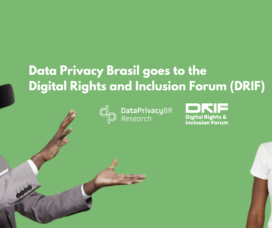
Data Privacy Brasil goes to the Digital Rights and Inclusion Forum (DRIF)
For the third consecutive year, Data Privacy Brasil will participate in the Digital Rights and Inclusion Forum (DRIF). DRIF – formerly known as the Internet Freedom Forum (IFF) – is an annual forum organized by Paradigm Initiative (PIN), since 2013, to be a space for discussions on global issues related to digital rights and inclusion.
-
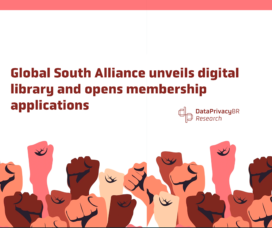
Global South Alliance unveils digital library and opens membership applications
The GSA invites organizations to express their interest in joining the network by completing the application form available until April 24.
-
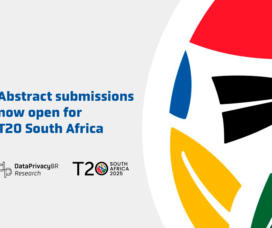
Abstract submissions now open for T20 South Africa
The Think20 South Africa invites researchers from around the world to contribute to a dynamic exchange of ideas on today's most pertinent challenges. The deadline for submitting abstracts is February 10, 2025.
-
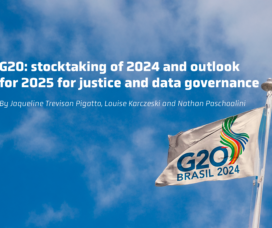
G20: stocktaking of 2024 and outlook for 2025 for justice and data governance
In 2024, Data Privacy Brasil took on a new and exciting challenge: participating in the G20 ecosystem, during the Brazilian presidency, through the official engagement group for think tanks, Think 20 (T20). Check out the text to learn more about Data's work at the G20.
-
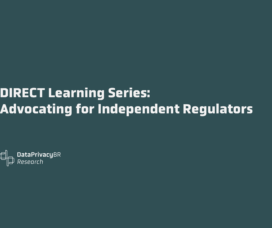
DIRECT Learning Series: Advocating for Independent Regulators
The 6th workshop took place on November 6th, 2024, in the context of the Data Rights and Enforcement through Community Trust (DIRECT) Learning Series, an ongoing thematic series of workshops with members of the DIRECT consortium, supported by Internews.
-
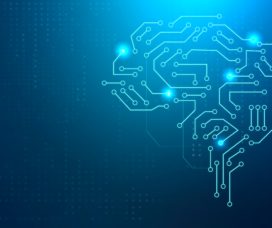
Exploring Opportunities in the Digital Economy and AI at the G20
The task force 5 of T20 Brasil has engaged several international think tanks to provide ideas and policy proposals on crucial areas of technological development, such as AI and Digital Public Infrastructures. This includes encouraging G20 nations to adopt policies that protect individual rights while fostering innovation.
Veja Também
-

Five-Point Plan for an Inclusive WSIS+20 Review
As stakeholders engaged in the WSIS+20 Review process, organizations sign the petition presenting recommendations to help operationalize the WSIS+20 review modalities in order to ensure transparency, inclusion, and meaningful stakeholder engagement.
-

Data Privacy Brasil goes to the Digital Rights and Inclusion Forum (DRIF)
For the third consecutive year, Data Privacy Brasil will participate in the Digital Rights and Inclusion Forum (DRIF). DRIF – formerly known as the Internet Freedom Forum (IFF) – is an annual forum organized by Paradigm Initiative (PIN), since 2013, to be a space for discussions on global issues related to digital rights and inclusion.
-

Global South Alliance unveils digital library and opens membership applications
The GSA invites organizations to express their interest in joining the network by completing the application form available until April 24.
-

Abstract submissions now open for T20 South Africa
The Think20 South Africa invites researchers from around the world to contribute to a dynamic exchange of ideas on today's most pertinent challenges. The deadline for submitting abstracts is February 10, 2025.
-

G20: stocktaking of 2024 and outlook for 2025 for justice and data governance
In 2024, Data Privacy Brasil took on a new and exciting challenge: participating in the G20 ecosystem, during the Brazilian presidency, through the official engagement group for think tanks, Think 20 (T20). Check out the text to learn more about Data's work at the G20.
-

DIRECT Learning Series: Advocating for Independent Regulators
The 6th workshop took place on November 6th, 2024, in the context of the Data Rights and Enforcement through Community Trust (DIRECT) Learning Series, an ongoing thematic series of workshops with members of the DIRECT consortium, supported by Internews.
-

Exploring Opportunities in the Digital Economy and AI at the G20
The task force 5 of T20 Brasil has engaged several international think tanks to provide ideas and policy proposals on crucial areas of technological development, such as AI and Digital Public Infrastructures. This includes encouraging G20 nations to adopt policies that protect individual rights while fostering innovation.
-

DIRECT Learning Series: data protection training and capacity building
The 5th workshop took place on October 2nd, 2024, in the context of the Data Rights and Enforcement through Community Trust (DIRECT) Learning Series, an ongoing thematic series of workshops with members of the DIRECT consortium, supported by Internews.
-
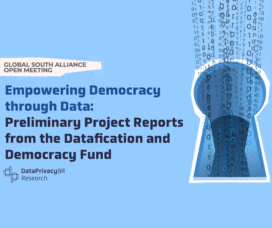
Empowering Democracy through Data: preliminary project reports from the DDF
The Global South Alliance wil host its next open meeting on October 22, 2024, where grantees from the first cohort of the Datafication and Democracy Fund (DDF) will present their impactful research.
-
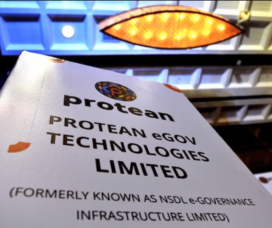
Protean acknowledged for leadership in digital public infrastructure
A report from Data Privacy Brasil underscores how DPI can be leveraged to create environments where data privacy and security are prioritized.
-
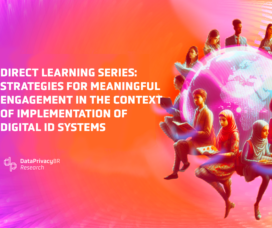
DIRECT Learning Series: strategies for meaningful engagement in the context of implementation of Digital ID systems
This workshop took place on August 28th, 2024, in the context of the Data Rights and Enforcement through Community Trust (DIRECT) Learning Series, an ongoing thematic series of workshops with members of the DIRECT consortium, supported by Internews.
-
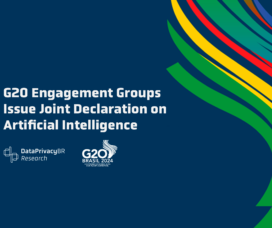
G20 Engagement Groups Issue Joint Declaration on Artificial Intelligence
On Tuesday (10), the main G20 engagement groups, including Civil 20 (C20), Labor 20 (L20), Think 20 (T20) and Women 20 (W20), announced a groundbreaking joint statement on the ethical, sustainable and inclusive development and deployment of artificial intelligence (AI).
-
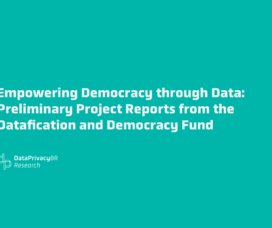
Empowering Democracy through Data: Preliminary Project Reports from the Datafication and Democracy Fund
The Global South Alliance held its first meeting with the organizations covered by the Datafication and Democracy Fund. On the occasion, each of the five organizations - Like a Palm Tree (Africa), Center of Security and Citizenship Studies (LatAm), Corporación Cambio Sostenible (LatAm), Criminal Justice & Policy Accountability Project (India), and Ikigai Innovation Initiative (Africa) - had the opportunity to present the preliminary results of their projects and hear feedbacks from the GSA members.
-
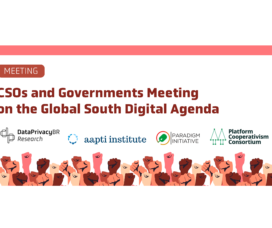
CSOs and Governments Meeting on the Global South Digital Agenda
On September 21st and 24th, the event “Open Dialogue: Global South Alliance and Governments for an Inclusive Digital Agenda” will take place, promoted by the organizations Data Privacy Brasil, Aapti Institute, Paradigm Initiative and PCC (The New School). The event aims to provide an open conversation with diplomats about the international agenda for IPRs, AI, GDC implementation and G20 continuity.
-
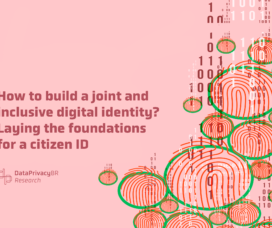
How to build a joint and inclusive digital identity? Laying the foundations for a citizen ID
Do you know what an identity is? Thinking about facilitating access to the topic, Data Privacy Brasil has developed a series of content to provide the foundations and tools possible for all the details on the subject. With this, we will be able to discuss, as a community, what we want with a digital identity and how we can achieve it.
-
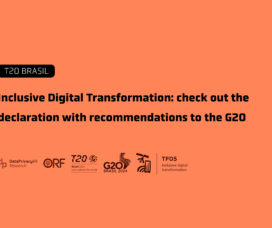
Inclusive Digital Transformation: check out the declaration with recommendations to the G20
In the document, six priorities were defined to deal with issues such as digital inclusion and meaningful universal connectivity; and challenges, opportunities and governance of artificial intelligence.
-
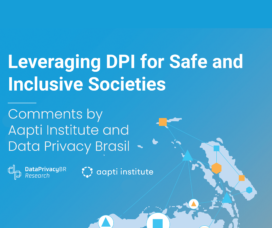
Leveraging DPI for Safe and Inclusive Societies
Aapti and Data Privacy Brasil have submitted their contribution to the Office of the United Nations Secretary-General's Envoy on Technology (OSET) and the United Nations Development Programme (UNDP) regarding the report "Leveraging DPI for Safe and Inclusive Societies".
-
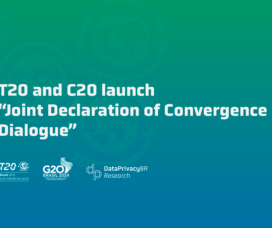
T20 and C20 launch “Joint Declaration of Convergence Dialogue”
On the 2nd and 3rd of July, a Mid-Term Conference took place in Rio de Janeiro, a T20 event with the participation of leaders from national and international think tanks, members of academia, representatives of the private and public sectors and civil society to discuss and propose solutions to the main global challenges.
-

Datafication and Democracy Fund welcomes five organizations from the Global South for short-term projects
The Datafication and Democracy Fund Committee, composed of Data Privacy Brasil, Paradigm Initiative, and Aapti Institute, is pleased to announce the five organizations awarded funding for a short-term research project.
-
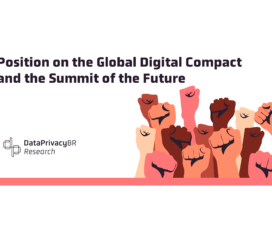
Position on the Global Digital Compact and the Summit of the Future
Between the 9th and 10th of May, the UN Civil Society Conference is happening in Nairobi. The event is presented as an opportunity to engage civil society in preliminary discussions ahead of the Summit of the Future.
-
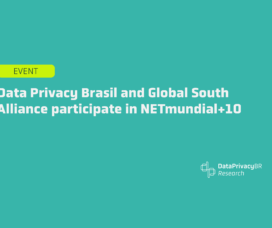
Data Privacy Brasil and Global South Alliance participate in NETmundial+10
Between April 29th and 30th, the NETmundial+10 took place in São Paulo. Building upon the event and the NETmundial Declaration of 2014, this event focused on strengthening global multistakeholder governance for the Internet and digital technologies, as well as conveying messages to global actors for better coordination of various ongoing processes.
-
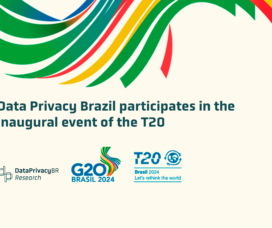
Data Privacy Brazil participates in the inaugural event of the T20
Between March 4th and 6th, the Organizing Committee of T20 Brazil - composed of CEBRI, FUNAG, and IPEA - held the first official event of the engagement group. The event took place entirely virtually and was openly broadcast to the public.
-

Inclusive Digital Transformation in the T20
The year 2024 marks Brazil's presidency in the G20, the group of the world's largest economies, chaired by our country for the first time. It is a year of great opportunity for Brazil to influence a broad global governance agenda, prioritizing issues such as inequality, climate change, and, of course, digital transformations.
-
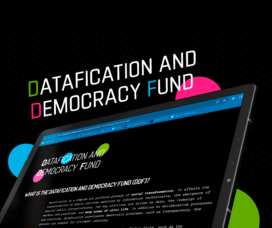
Data Privacy Brasil, Paradigm Initiative and Aapti Institute announce the launch of the “Datafication and Democracy Fund”
The fund aims to finance activities that strengthen the work of NGOs in the Global South on issues of datafication and democracy
-
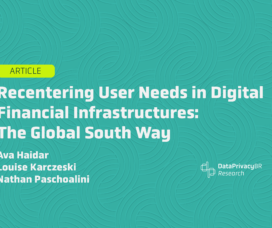
Recentering User Needs in Digital Financial Infrastructures: The Global South Way
Through India’s G20 leadership in 2023, global agendas of digital transformation and financial growth have come to be intimately reoriented to challenges, priorities and special developments in the Global South.
-

At UNCTAD eWeek, Data Privacy Brasil will discuss the intersection between digital economy and human rights in AI regulation
The UNCTAD eWeek, an initiative of the United Nations Conference on Trade and Development (UNCTAD) in partnership with eTrade for all, will occur from the 4th until the 8th of December.
-
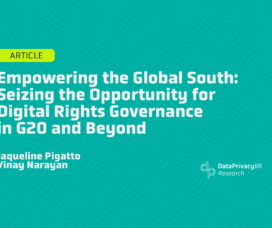
Empowering the Global South: Seizing the Opportunity for Digital Rights Governance in G20 and Beyond
The G20 represents a critical policy space for addressing emergent challenges on a global scale and its importance as a platform is pronounced when we consider its significance for the Global South.
-
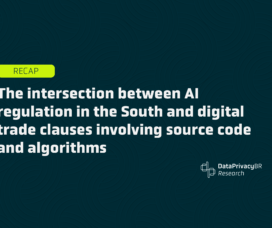
The intersection between AI regulation in the South and digital trade clauses involving source code and algorithms
Recap of Session 43 of the WTO’s 2023 Public Forum organized by Data Privacy Brasil and REBRIP
-
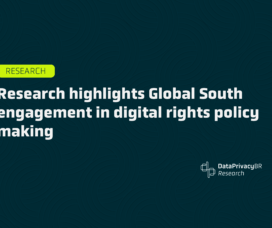
Research highlights Global South engagement in digital rights policy making
The Data Privacy Brasil Research Association announces the launch of the research report on Global South perspectives on international engagement in digital rights.
-
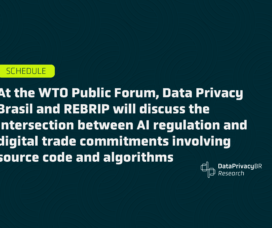
At the WTO Public Forum, Data Privacy Brasil and REBRIP will discuss the intersection between AI regulation and digital trade commitments involving source code and algorithms.
The WTO Public Forum 2023 will take place between September 12th and 15th in Geneva.
-

Data Privacy Brasil’s contribution to the Thematic Deep Dive of Artificial Intelligence and other Emerging Technologies of the Global Digital Compact
As other civil society organizations already pointed out, notable preference was given to the speech of Member States, UN agencies, and the private sector, at the expense of human rights civil society organizations, which prevented the speech that had been prepared by the DBPR and other civil society stakeholders.
-
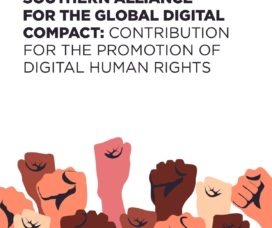
Southern Alliance for the Global Digital Compact
Responding to the call made by the United Nations, the Data Privacy Brazil Research Association, together with organizations from the Global South, presents a contribution to the Global Digital Compact.
-
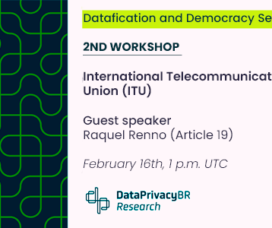
Our second workshop of a series about technical forum talks about the International Telecommunications Union
In the second meeting of the Datafication and Democracy Workshop Series, we received Raquel Renno, Digital Programme Officer of Article 19, who spoke about the International Telecommunication Union (ITU) for third sector organizations.
-
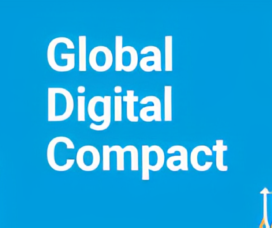
Let’s stay tuned for the Global Digital Compact
What is the Global Digital Compact and why is it important to keep an eye on it?
-
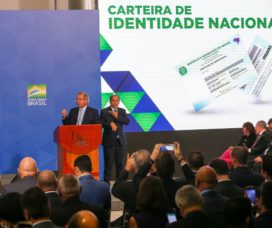
Why should we all pay attention to the Brazilian Digital ID system?
The implementation of digital identity systems is increasing around the world, especially in Global Southern countries. The model widely adopted is known as Big ID, promoted by or linked to public administration bodies which use centralized biometric databases to identify and authenticate citizens (Access Now, 2021).
DataPrivacyBr Research | Content under licensing CC BY-SA 4.0

